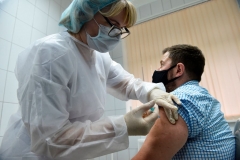
A nurse inoculates volunteer Ilya Dubrovin, 36, with Russia’s new coronavirus vaccine in a post-registration trials at a clinic in Moscow on September 10, 2020. – Russia announced last month that its vaccine, named “Sputnik V” after the Soviet-era satellite that was the first launched into space in 1957, had already received approval. (Photo by NATALIA KOLESNIKOVA/AFP via Getty Images)
(CNSNews.com) – Former FDA Commissioner Scott Gottlieb warned Sunday that doctors don’t know “the full impact” of COVID-19, because in rare cases, some people have persistent symptoms from the coronavirus.
“We don’t know the full impact of the virus. What we’re seeing in various studies is that there is some long-term sequelae related to the virus, so we don’t really understand what their relationship is to the virus itself,” Gottlieb told CBS’ “Face the Nation.”
“The virus does seem to trigger in certain people rarely, but in certain people some kind of autoimmune type of phenomena where you get some persistent symptoms from the virus, and when you’re infecting so many people with the virus as we are, even a small percentage of patients having some persistent symptoms ends up being a lot of people, and so there’s more and more evidence of this,” he said.
“This syndrome hasn’t been fully characterized, but there is– I think there is enough evidence right now to suggest that there are people who are having long-term sequelae from the infection,” Gottlieb added.
Host Margaret Brennan asked what Americans can expect from a vaccine, given that Dr. Anthony Fauci, director of the National Institutes of Allergy and Infectious Diseases, has said it won’t be 100 percent effective.
“Well, look, we don’t know yet. We don’t have the data. There’s major trials underway with more than 30,000 patients in each trial. Pfizer enrolled 44,000, Moderna 30,000. J&J just announced a trial with 60,000 patients,” Gottlieb said.
“These are major outcomes trials, so we should wait and see what the data ultimately shows, but the expectation is that this vaccine is going to be partially protective, a lot like the flu vaccine, where for certain people it will provide full immunity, but for other people it’s not going to provide as much protection,” he said.
“Maybe it will lessen the severity of COVID if they contract the infection, but it’s not going to provide what we call sterile immunity, which means you’re not going to be able to get infected with COVID. There will be some people who still get infected with COVID. That’s the expectation,” Gottlieb said.
“Now, it could be that the vaccines prove to be much more effective than we expect. It could be that the vaccines prove to be a lot less effective than we expect, but I think that should be the base case, the basic expectation of individuals,” he added..
Brennan asked if Gottlieb agrees with CDC Director Robert Redfield that 90 percent of Americans remain susceptible to the virus.
“That’s what the data shows, I mean, CDC has some data that they’ve developed looking at antibodies across the country, basically layering tests onto normal blood draws being done by LabCorp and Quest to look at how many Americans have antibodies to coronavirus, and so they’re deriving some of that information from that very large project that they’ve undertaken, but other studies seem to indicate about the same thing,” Gottlieb said.
“About 10 percent of Americans have been exposed to this virus. The best modeling that I’ve seen that suggests that there could be a higher rate of exposure suggests that maybe it’s as high as 15 percent, but most of the models project around 10 percent. So it means a lot of the country is still very susceptible to this virus. There’s a lot of room for it to run,” he said.


